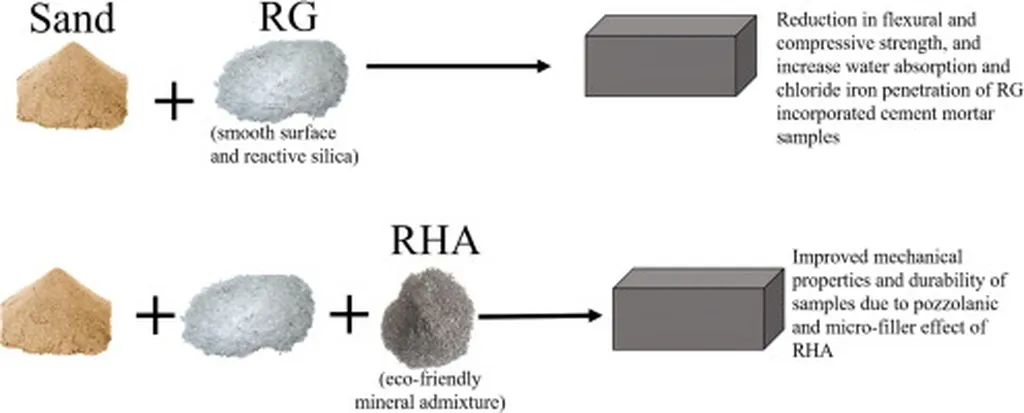In a groundbreaking study that could revolutionize road construction and waste management, researchers have discovered that rice husk ash (RHA) and carbonation treatment can significantly enhance the mechanical properties of recycled aggregates. This innovative approach not only promotes the utilization of solid waste but also opens new avenues for sustainable and cost-effective construction practices.
The research, led by Haocheng Lai from the Shaoxing Key Laboratory of Interaction Between Soft Soil Foundation and Building Structure at Shaoxing University in China, explores the effects of varying RHA contents and carbonation durations on the unconfined compressive strength (UCS) of lime-stabilized recycled aggregates. The findings, published in the journal “Materials Research Express” (translated to English as “Materials Research Express”), offer promising insights for the construction and energy sectors.
Lai and his team conducted a series of UCS tests, X-ray diffraction (XRD) analyses, energy dispersive spectroscopy (EDS), and scanning electron microscopy (SEM) to investigate the chemical composition, elemental content, and surface morphology of the treated aggregates. The results were compelling. “Both RHA and carbonation treatment significantly improve the UCS of lime-stabilized recycled aggregates,” Lai explained. “We identified the optimal RHA content and carbonation time as 6% and 12 hours, respectively.”
The study revealed that while RHA and carbonation treatment do not alter the chemical composition of the aggregates, they promote the formation of C–S–H gels and CaCO3, enhancing the densification of the gels. However, excessive carbonation can lead to decalcification of the C–S–H gel, reducing the calcium-to-silicon ratio and increasing porosity, which deteriorates the microstructure of the aggregates.
The commercial implications of this research are substantial. By utilizing rice husk ash, a byproduct of rice milling, and carbonation treatment, construction companies can reduce their reliance on natural aggregates and minimize waste. This not only lowers construction costs but also contributes to environmental sustainability.
“Our findings support the practical application of RHA and carbonation treatment methods in road engineering,” Lai stated. “This approach can lead to more sustainable and cost-effective construction practices, benefiting both the environment and the industry.”
The research also highlights the potential for further advancements in the field. As the construction industry continues to seek sustainable and innovative solutions, the integration of waste materials and advanced treatment methods like carbonation could become a standard practice. This study paves the way for future developments, encouraging researchers and practitioners to explore the full potential of recycled aggregates and waste materials in construction.
In conclusion, the study by Lai and his team offers a promising solution for enhancing the mechanical properties of recycled aggregates using rice husk ash and carbonation treatment. The findings not only have significant commercial impacts for the construction and energy sectors but also contribute to the broader goal of sustainable development. As the industry continues to evolve, this research provides a valuable foundation for future innovations in road construction and waste management.

